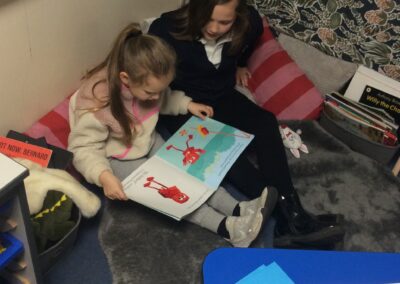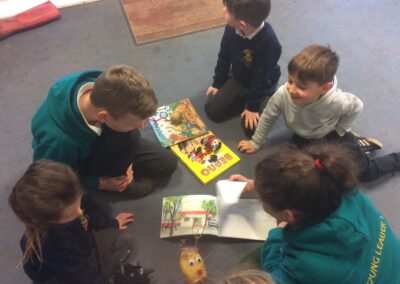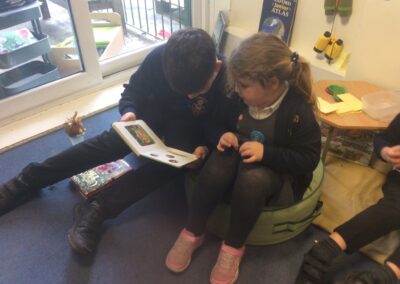Curriculum Overview
Our vision for our phonics and early reading provision is that it:
- Inspires teaching and learning
- Improves children’s life chances
- Empowers children
- Drives the engine of our curriculum
Intent
The intent behind our phonics approach is to:
- Deliver a high-quality systematic synthetic phonicsprogramme of proven effectiveness, followed with rigour and fidelity so that children are taught consistently to use phonics as the route to reading unknown words.
- Ensure pace of the phonics programme is maintained through high quality teaching and same day intervention, so that children become confident, fluent and independent readers.
- Ensure children’s reading books show a cumulative progression in phonics knowledge that match the grapheme-phoneme correspondences they know to support decoding skills, building fluency.
Implementation
Phonics is implemented through the Little Wandle programme.
Daily phonics lessons in Reception and Year 1
- We teach phonics from week 2 in Reception and use the Little Wandle Letters and Sounds Revisedprogression, ensuring that children build on their growing knowledge of the alphabetic code, mastering phonics to read and spell as they move through school.
- We teach phonics for 30 minutes a day. In Reception, we build from 10-minute lessons, with additional daily oral blending games, to the full-length lesson as quickly as possible.
- We follow the Little Wandle Letters and Sounds Revisedexpectations of progress.
Daily Keep-up lessons ensure every child learns to read
- Phonics is taught in a whole class approach. Any gaps in knowledge are addressed through individual and group interventions (additional to whole class phonics sessions) from the start of the year in order for children to ‘keep up’ with their peers. Therefore, the children then move through the phase groups as one group together, Regular progress meetings are held with all reading teachers to monitor children making slowest progress. Children in danger of falling behind, or who are working behind the pace of the programme, are swiftly identified and enough additional support provided to enable them to keep up.
- Any child who needs additional practice has daily ‘Keep-up’ support, taught by a fully trained adult. Keep-up lessons match the structure of class teaching, and use the same procedures, resources and mantras, but in smaller steps with more repetition, so that every child secures their learning.
- We use the Little Wandle Letters and Sounds Revisedassessments to identify the gaps in children’s phonic knowledge and teach to these using the Keep-up resources – at pace.
Teaching reading: Guided Reading practice sessions three times a week
- We teach children to read through guided reading practice sessions three times a week.
- Children read books matched to the children’s secure phonic knowledge using the Little Wandle Letters and Sounds Revised assessments.
- We engage our families and share information about phonics and how children learn to blend and other aspects of our provision, both online and through workshops.
Ensuring consistency and pace of progress
- Every teacher, academic mentor and teaching support assistant in our school has been trained to teach early reading by Little Wandle, so we have the same expectations of progress. We use the same language, routines and resources to teach children to read so that we lower children’s cognitive load.
- Lesson templates, Prompt cards and How to videos ensure teachers all have a consistent approach and structure for each lesson.
- The Reading Leader, Headteacher and English Governor regularly monitor and observe teaching and track progress rigorously.
Impact
The impact of our consistent and systematic teaching of our phonics programme is that children become fluent and confident readers by the end of KS1. As part of the SSP, all pupils are regularly assessed: formative assessments take place during every phonics and catch up session in addition to half termly summative assessments. Staff work closely to monitor and share progress and attainment for individuals and groups of pupils. The Headteacher, Reading Leader and English Governor observe phonics sessions, hear readers and speak with pupils about their learning in order to monitor our provision.



